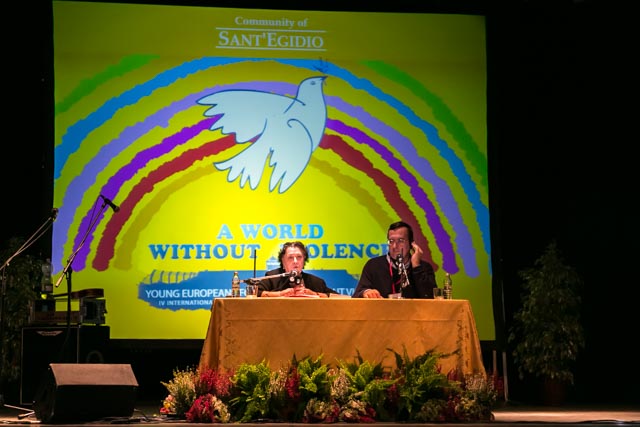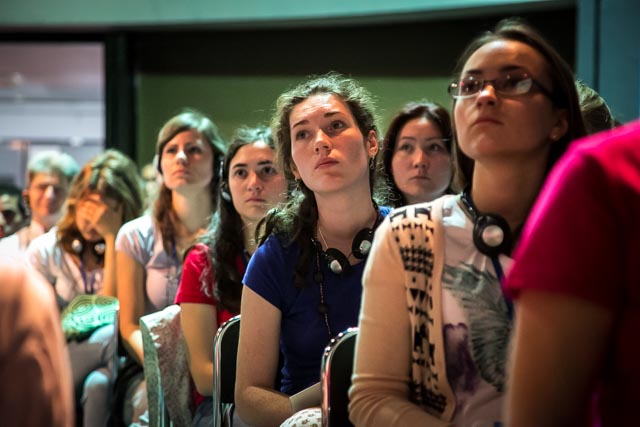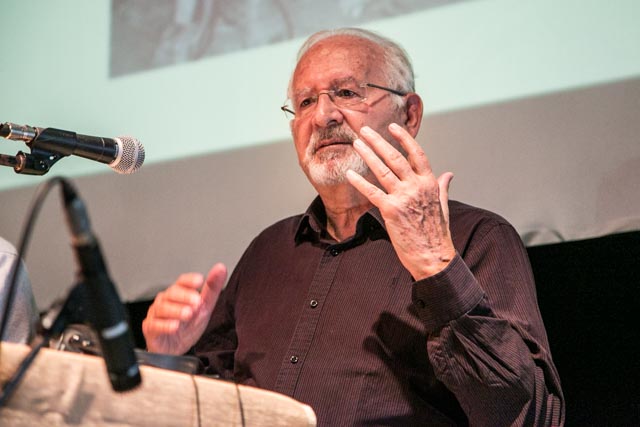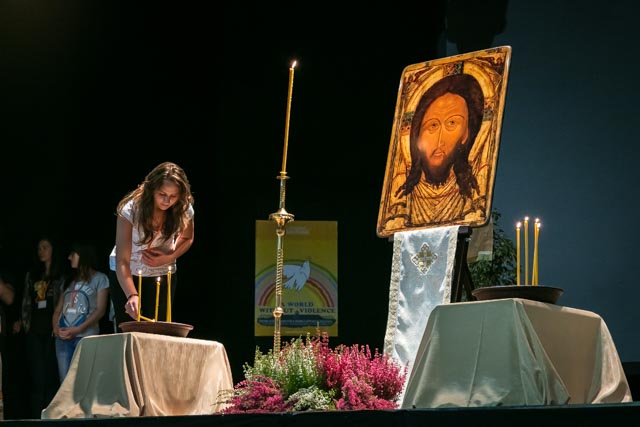 You are the future, the generation that can build a world without hatred, without discrimination, without racism. You can prevent hatred. You are the ones that can guarantee that there will not be a new holocaust». You are the future, the generation that can build a world without hatred, without discrimination, without racism. You can prevent hatred. You are the ones that can guarantee that there will not be a new holocaust».
These were the words by Rita Prigmore, a German Sinti woman that escaped the Porrajmos, the extermination of Roma and Sinti perpetrated by the Nazis, addressed to an audience of high school students in Central and Eastern Europe, who listened to her touched by the testimony of her personal history. The emotion for her story of a baby girl that with her twin sister, not survived, was subjected to the genetic experiments of Dr. Mengele’s team, was dissolved in a standing ovation and a common manifestation of warmth towards Rita Prigmore.
 Sant'Egidio, even in the countries of Central and Eastern Europe conducts an extensive solidarity work towards the Roma, subjected not infrequently to discrimination and violence. It was one of the reasons why the testimony of Rita Prigmore particularly affected young people, involved in work to raise awareness on issues of anti-gypsism, anti-Semitism, racism. Sant'Egidio, even in the countries of Central and Eastern Europe conducts an extensive solidarity work towards the Roma, subjected not infrequently to discrimination and violence. It was one of the reasons why the testimony of Rita Prigmore particularly affected young people, involved in work to raise awareness on issues of anti-gypsism, anti-Semitism, racism.
In Krakow, the first day of the fourth International Meeting "Young Europeans for a world without violence” was spent with great interest and a thousand youth from Russia and Ukraine, Poland, Hungary, Czech Republic, Slovakia, Romania, Georgia and Italy take part in it.
 To listen to Mordechai Peled, a jew of Romanian origin, an Auschwitz survivor, university students from the same countries met in another hall. Listening to the vibrant intervention of a witness that, as a teenager, knew the extermination camp, was particularly intense. His words sounded charged with highly topical interest to young Ukrainians and Russians living in the atmosphere of war affecting the eastern regions of Ukraine. To listen to Mordechai Peled, a jew of Romanian origin, an Auschwitz survivor, university students from the same countries met in another hall. Listening to the vibrant intervention of a witness that, as a teenager, knew the extermination camp, was particularly intense. His words sounded charged with highly topical interest to young Ukrainians and Russians living in the atmosphere of war affecting the eastern regions of Ukraine.
«Hatred and revenge are against life - Mordechai Peled said in a passage followed with great interest -. At some point you have to say stop to the violence. I do not feel hatred towards the Germans. The way of peace is forgiveness and reconciliation».
 The questions, concerns, fears and hopes of the many wars that hit different regions of the world, the third world war in pieces as it was defined by Pope Francis, were at the centre of attention in the working and discussion groups, to then converge in a prayer for peace that ended the day. The names of Iraq, Syria, Ukraine, Central Africa, Congo and other countries at war, echoed as representatives of the various national groups present lit candles in an evocative and touching ritual. The need for peace and young people’s commitment to a future without violence will accompany the visit of Friday 19 September to the Auschwitz camp. The questions, concerns, fears and hopes of the many wars that hit different regions of the world, the third world war in pieces as it was defined by Pope Francis, were at the centre of attention in the working and discussion groups, to then converge in a prayer for peace that ended the day. The names of Iraq, Syria, Ukraine, Central Africa, Congo and other countries at war, echoed as representatives of the various national groups present lit candles in an evocative and touching ritual. The need for peace and young people’s commitment to a future without violence will accompany the visit of Friday 19 September to the Auschwitz camp.
|

